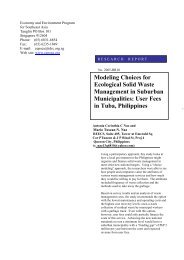systems research - the IDRC Digital Library - International ...
systems research - the IDRC Digital Library - International ...
systems research - the IDRC Digital Library - International ...
Create successful ePaper yourself
Turn your PDF publications into a flip-book with our unique Google optimized e-Paper software.
o Limited feedback at all levels. A mechanism is needed to encourage<br />
frequent interaction among project participants.<br />
o Tools for monitoring, evaluation, and impact assessment and <strong>the</strong> need to<br />
link <strong>the</strong>se activities as a continuum in FSR&E projects.<br />
o Cases of extension specialists turned <strong>research</strong>er. This attitude was<br />
encountered with RADOS and RIARS; <strong>the</strong>refore, <strong>the</strong>re is a need to<br />
instill <strong>the</strong> extension responsibilities in FSR&D staff and to develop a<br />
<strong>research</strong>-extension interface.<br />
o Limited appreciation of <strong>the</strong> contribution of farmers to FSRRrE by o<strong>the</strong>r<br />
development workers. There is a need for intensive training and<br />
information dissemination on FSRRrE.<br />
o Limited FSRRrE personnel because of <strong>the</strong> reassignment of trained<br />
personnel with <strong>the</strong> implementation of <strong>the</strong> local government code.<br />
Apart from <strong>the</strong>se issues and problems, o<strong>the</strong>r matters must be mentioned: <strong>the</strong> need<br />
for more practical and flexible approaches or methodologies for FSR&D, <strong>the</strong><br />
organization and managerial problenls associated with decentralized FSR&D, <strong>the</strong><br />
operations of a multidisciplinary and interdisciplinary team, reorientation from a<br />
technology-focused approach to problem (opportunity)-driven activities, indigenous<br />
technical knowledge and <strong>the</strong> changing environment, and technology<br />
commercialization and FSR&E.<br />
A COURSE OF ACTION<br />
This historical analysis of farnling <strong>systems</strong> <strong>research</strong> and development in <strong>the</strong><br />
Philippines has revealed <strong>the</strong> impact of <strong>the</strong> approach on <strong>the</strong> <strong>research</strong> and extension<br />
system of <strong>the</strong> country. The impact is reflectzd in <strong>the</strong> changes that have occurred in<br />
<strong>the</strong> focus, conceptual approacl~, organization, and management of <strong>the</strong> agricultural<br />
<strong>research</strong> and extension system. The <strong>research</strong> and extension system responded to <strong>the</strong><br />
evolution of farming <strong>systems</strong> <strong>research</strong> and development methodologies and<br />
concepts.<br />
The farming s stems <strong>research</strong> and development approach is still evolving.<br />
The potential of <strong>the</strong> ! arming <strong>systems</strong> <strong>research</strong> and development network to<br />
orchestrate this evolution is evident. The farming <strong>systems</strong> <strong>research</strong> and development<br />
could be mobilized to address <strong>the</strong>se issues by specifically supporting <strong>the</strong><br />
development of (1) ASES and related tools (e.g., GIS) to make use of <strong>the</strong> data bases<br />
that are generated a common framework for FS diagnosis and design that employs<br />
RRA and related techniques and o<strong>the</strong>r formal approaches, (2) techniques to<br />
integrate stability and sustainability analysis in farming <strong>systems</strong> development,<br />
(3) impact assessment methodology to tackle both micro and macro impacts, and
















